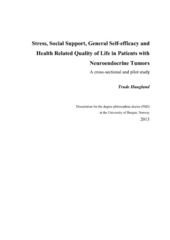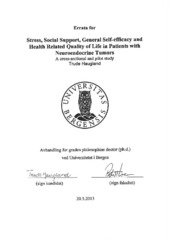| dc.contributor.author | Haugland, Trude | en_US |
| dc.date.accessioned | 2013-07-08T09:38:22Z | |
| dc.date.available | 2013-07-08T09:38:22Z | |
| dc.date.issued | 2013-06-12 | eng |
| dc.identifier.isbn | 978-82-308-2314-9 | en_US |
| dc.identifier.uri | https://hdl.handle.net/1956/6775 | |
| dc.description.abstract | Background: Neuroendocrine tumor (NET) is a chronic irreversible disease after metastases occur which has to be managed rather than cured. Getting an irreversible, slow growing cancer disease may be perceived as a health threat and cause stress. A balance between evaluation of individual disability and need for palliative treatment with the risk of adverse reactions may be a challenge in managing the disease. Interventions enabling patients to cope with stress and improve health related quality of life (HRQoL) may be a complementary treatment option. Personal resources such as social support and general self-efficacy have demonstrated to be associated with better HRQoL. An intervention based on the principles of self-efficacy to cope with stress and improve health outcomes in patients with NET is necessary and timely. However, the literature is sparse on issues of stress, general self-efficacy, social support and HRQoL in patients with NET. Aim: The objective of this thesis aims to 1) expand knowledge of HRQoL in patients with NET; 2) evaluate the association between stress, general self-efficacy, social support and HRQoL and 3) evaluate the importance of a patient education intervention based on the principles of self-efficacy. Methods: A cross sectional descriptive, survey design and an explorative, longitudinal design of three points in time were used. Recruitment of two different samples was collected in order to perform the studies. In June 2007, data were collected at all NET centers nationwide for the cross sectional study and 196 patients returned the questionnaires. From September 2005 to December 2007, 37 patients from three of five NET centers completed the intervention data were collected for the exploratory, study. The questionnaires covered socio-demographic and self-reported HRQoL (SF- 36), stress (Impact of Event Scale), social support (Interpersonal Social Evaluation List) and general self-efficacy (General Self-efficacy). Results: Chi-square statistics and Analysis of variance demonstrated that lower age, part-time or full-time employment, higher education and higher income levels were associated better HRQoL. Bonferroni correction was used to adjust the level of significance. T-tests demonstrated that patients with NET had poorer HRQoL than the general Norwegian population on all subscales of the SF-36 except for bodily pain. The largest difference demonstrated by effect sizes was general health, role limitations physical and vitality (Paper I). Multiple linear regressions demonstrated that having symptoms and co-morbid conditions predicted poorer HRQoL. In addition, higher stress was significantly associated with poorer mental and physical HRQoL and higher levels of social support and general self-efficacy were significantly associated with better mental HRQoL. Furthermore, higher levels of general self-efficacy were significantly associated with better physical HRQoL. Finally, social support and general self-efficacy partly mediated the relationship between stress-and mental HRQoL (Paper II). Mixed effect models showed that stress, general self-efficacy and physical HRQoL changed significantly following a 6- month patient educational intervention. Symptoms and co-morbidity were inversely associated with physical HRQoL(Paper III). Conclusion: Patients with NET demonstrated poorer HRQoL than the general Norwegian population on all subscales of SF-36, except bodily pain. Stress related negatively to poorer HRQoL and those with more social support and higher levels of general self-efficacy had better HRQoL than those with less social support and lower levels of general self-efficacy. In addition, social support and general self-efficacy had a partly mediating relationship with the stress-HRQoL association. The exploratory study demonstrated that stress was reduced and general self-efficacy and physical HRQoL were improved following the intervention. The intervention needs to be replicated in a RTC with appropriate sampling. | en_US |
| dc.language.iso | eng | eng |
| dc.publisher | The University of Bergen | eng |
| dc.relation.haspart | Paper I: Haugland T, Vatn MH, Veenstra M, Wahl AK, Natvig GK. Health Related Quality of Life in Patients with Neuroendocrine Tumors compared with the General Norwegian Population. Quality of Life Research, 2009, 18;719-726. Full text not available in BORA due to publisher restrictions. The published version is available at: <a href="http://dx.doi.org/10.1007/s11136-009-9487-x" target="blank">http://dx.doi.org/10.1007/s11136-009-9487-x</a> | en_US |
| dc.relation.haspart | Paper II: Haugland T, Veenstra M, Vatn MH, Natvig GK, Wahl AK. Stress Health Related Quality of Life in Patients with Neuroendocrine. The Significance of Social Support and General Selfefficacy as Mediators? Full text not available in BORA. | en_US |
| dc.relation.haspart | Paper III: Haugland T, Veenstra M, Vatn MH, Wahl AK. Patient Education to Reduce Stress and Improve General Self-efficacy and Health Related Quality of Life in Patients with Neuroenocrine Tumors – a Pilot Study. Nursing Research and Practice, 2013, 695820. The article is available at: <a href="http://hdl.handle.net/1956/6774" target="blank">http://hdl.handle.net/1956/6774</a> | en_US |
| dc.title | Stress, Social Support, General Self-efficacy and Health Related Quality of Life in Patients with Neuroendocrine Tumors. A cross-sectional and pilot study | en_US |
| dc.type | Doctoral thesis | |
| dc.rights.holder | Copyright the author. All rights reserved | |

